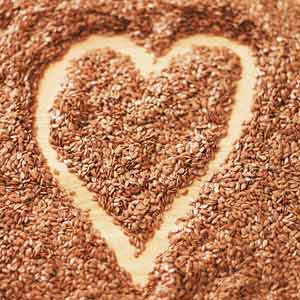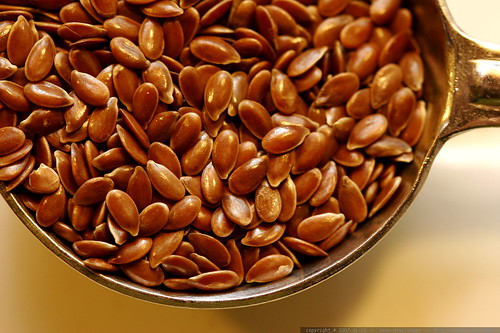WEEKLY ARTICLE
Just The Flax A client of ours, who is recovering very nicely from breast cancer, came to see us for a follow-up consultation this week. Follow-up consultation clients are usually accompanied by a long list of questions related to the many things they have heard since last seeing us, that are good versus aren't good, or are told to do by one health care professional, then told not to do by another, or have read controversial articles about, and so on, harboring generalized confusion, especially when it comes to what to eat. 
So, while talking, and discussing additional diet and lifestyle changes that our client could implement to continue to discourage cancer from ever setting up camp in her body again, the subject of flax seeds came up. One of her doctors had told her never to use them because of her history of breast cancer, but naturally, she had read that they were good for her. I told her my little story about flax seeds, which goes like this: In 1996 when I was diagnosed with stage three breast cancer and given 6 months to a year to live, I turned to macrobiotics for help. Flax seeds were an unknown entity in the macrobiotic world at that time. But like my client, I kept reading about how healthy they were. They were really an up and coming thing back then. They seemed to be especially beneficial in protecting against breast cancer according to what I was reading. And like my client, I was being bombarded with so much info, that it was getting super confusing, and difficult to decipher the good from the bad. So I made - up a little self-awareness rule. I decided that if I were repeatedly presented (via the universe), with the same "message", over and over again, that perhaps I had better take notice. (I bet you thought I was going to say Internet, but there wasn't an Internet back then - NO google, so I had to rely on receiving messages from the universe via pure intuition). The message about flax seeds kept finding and presenting itself to me. And fortunately, I took notice. 
After a short period of careful consideration, I decided that flax seeds were a whole, natural food, similar to sunflower, sesame, and pumpkin seeds, which are widely used in the macrobiotic diet for their numerous super food qualities. I couldn't imagine how flax seeds could be harmful.  So I took my then (and still) defunct coffee grinder, having converted to kukicha tea and banned all caffeine from my life, and used it to grind up a batch of fresh flax seeds. I So I took my then (and still) defunct coffee grinder, having converted to kukicha tea and banned all caffeine from my life, and used it to grind up a batch of fresh flax seeds. I  then placed the ground flax seeds in a glass jar in the fridge, so that then placed the ground flax seeds in a glass jar in the fridge, so that
I could easily take it out at least once a day and liberally sprinkle the flax seed powder over my fresh whole grains (about 2 tablespoons). I have been doing this all of these years, only now I add essential  fatty acid rich hemp seeds and chia seeds to the mix as well, making myself a delicious cancer protective, omega fatty acid rich, full of antioxidants, powdered cocktail that I chuckle about fatty acid rich hemp seeds and chia seeds to the mix as well, making myself a delicious cancer protective, omega fatty acid rich, full of antioxidants, powdered cocktail that I chuckle about  as I enjoy, reminiscing about how (in college, and only very briefly), I used to smoke hemp, paint with flax seed oil, and watch those silly chi, chi, chi, chia pet commercials on TV. Who knew I'd be eating those very items now to protect my health! as I enjoy, reminiscing about how (in college, and only very briefly), I used to smoke hemp, paint with flax seed oil, and watch those silly chi, chi, chi, chia pet commercials on TV. Who knew I'd be eating those very items now to protect my health! And please note: hemp seeds are in no way related to marijuana, it was just a joke! Same species, but different plant entirely. Hemp seeds are not a drug. Now to the Flax Facts: Flax seeds provide a great source of intestine detoxifying fiber. They have long been known to promote bowel regularity. As said previously, flax seeds are a great source of essential omega fatty acids as well. These are the same, good for you essential oils found in fish oil; so flax seeds essentially provide us with the same health benefits that fish oil does. 
Flax seeds, and their naturally occurring omega fatty acids, are therefore excellent for heart and artery health, the same as their hard working fish oil counterparts. Flax seeds also contain lignans, a plant compound that the body converts to a phyto-estrogen. Phyto - estrogens resemble estrogen structurally, so thereby have the innate ability to fit into the body's estrogen receptor sites where they effectively block dangerous synthetic estrogens from attaching, and causing such problems as breast cancer. Synthetic, "bad" estrogens can come from birth control pills, hormone replacement therapies, household cleaning products, make-up, nail polish, and other unnatural body care products, insecticides, plastics containing BPA, and animal foods coming from hormone injected animals, to name just a few sources. Many studies have shown that people who eat a lignan rich diet have a lower incidence of breast, colon, and prostate cancer. And some studies have explored the possibility (positively) that flax seeds may have strong enough anti-cancer properties that they benefit women with active breast cancer, slowing the aggressiveness of the cancer cell growth, and even halting the growth of some of the cancer cells. Flax seeds also help the liver metabolize and flush both naturally occurring estrogen, and chemically toxic "bad" estrogen out of the body, preventing the build-up of both within the body before they ever become problematic. You can buy fresh organic flax seeds at the health food store. Because the oil is highly volatile, breaking down, loosing it's high lignan potency, and becoming rancid very quickly, it is best to store the flax seeds in the refrigerator in their whole form, grinding about a weeks worth at a time, and keeping the freshly ground powder refrigerated as well. The very strong outer shell of the intact flax seed protects and preserves the valuable oil found within. That same outer shell makes whole flax seeds pretty difficult to chew / digest, so it is necessary to use them as ground seeds or oil. Do not try to use the whole seed. 
We prefer the freshly ground seeds to flax oil because they contain a higher (and fresher) lignan content, and fiber. There is no fiber in flax seed oil. 
Enjoy the freshly ground seeds sprinkled over grains, in dressings, on salads and vegetables, or in desserts. Like we said, one or two tablespoons a day is all you need, along with the rest of your balanced and healthy Wholly Macro diet! And BTW, the macrobiotic community has come to fully endorse the use of flax seeds in the diet. No controversy. No conflict. No confusion. Just the flax facts! In The Best Of Health To You As Always. Gayle and Jaime / Wholly Macro |